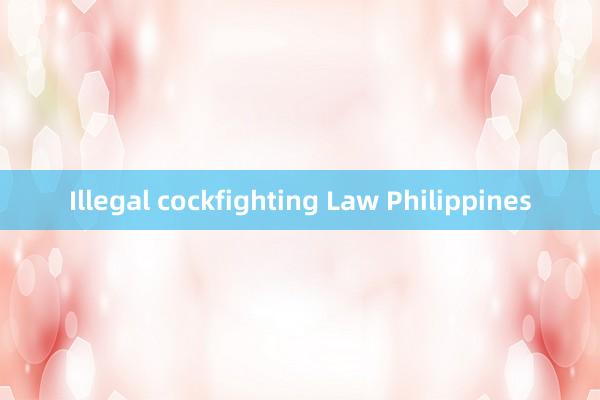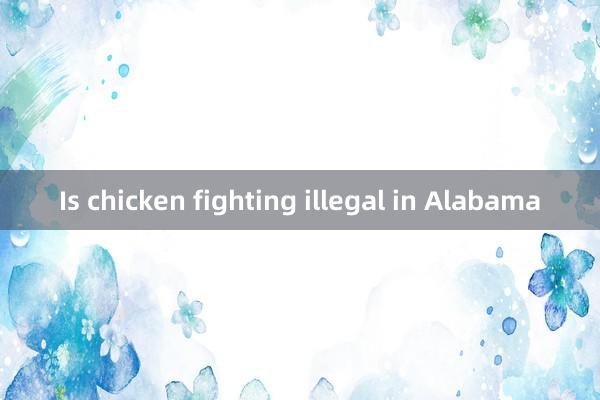Illegal cockfighting Law Philippines

Title: Illegal Cockfighting Laws in the Philippines
Cockfighting, locally known as “sabong,” is a popular activity in the Philippines with deep cultural roots. However, illegal cockfighting has raised significant concerns in the country, prompting the government to implement strict regulations and laws to curb it. This article explores the Philippine laws surrounding cockfighting, the reasons behind these regulations, and the potential consequences for those caught participating in illegal cockfighting activities.
The Cultural Significance of Cockfighting
Cockfighting has been a part of Filipino culture for centuries, often viewed as a sport, social gathering, and form of entertainment. In rural areas, it’s not uncommon for locals to spend weekends at cockfighting pits, placing bets and cheering for their chosen roosters. For some, cockfighting is more than a pastime—it’s a tradition passed down through generations.
Despite its cultural importance, cockfighting has also become a subject of controversy, especially regarding animal welfare. While traditional cockfighting events are allowed in licensed venues under specific conditions, a significant portion of the activity occurs illegally, leading to unregulated betting and other social issues.
Legal Cockfighting vs. Illegal Cockfighting
In the Philippines, cockfighting is regulated under specific laws that distinguish between legal and illegal activities. Legal cockfights are strictly regulated events held in licensed arenas, commonly known as cockpits. These events are typically overseen by local government units and permitted only on Sundays and during certain holidays and festivals. In contrast, illegal cockfighting involves unregulated events held outside authorized venues, often leading to issues such as underage gambling,chich69 violence, go88 tài xỉu and lack of control over the sport’s ethical aspects.
Republic Act No. 9287 and Presidential Decree No. 449
The Philippine government has enacted several laws to regulate cockfighting and prevent illegal practices. Two of the most prominent regulations include Republic Act No. 9287 and Presidential Decree No. 449, phim rule 34 also known as the Cockfighting Law of 1974.
-
Republic Act No. 9287: Primarily aimed at curbing illegal gambling, RA 9287 imposes strict penalties for those involved in illegal betting activities, including cockfighting. The law is not limited to cockfighting but covers all forms of illegal gambling. It allows for higher penalties, including fines and imprisonment, for anyone caught betting on illegal cockfights.
-
Presidential Decree No. 449: Also known as the Cockfighting Law of 1974, this law outlines the conditions under which cockfighting can be conducted legally. According to the decree, cockfighting is permitted only on Sundays, legal holidays, and during local fiestas, provided it is held in a licensed cockpit. The law also specifies that minors are strictly prohibited from participating in or watching the sport. This decree serves as a guideline for local governments to control and monitor cockfighting events, aiming to prevent illegal activities associated with it.
đăng ký đăng nhập slot go88
Consequences of Participating in Illegal Cockfighting
The Philippine government has taken a firm stance against illegal cockfighting, and penalties for involvement can be severe. Participants in illegal cockfighting can face criminal charges, which may result in hefty fines and imprisonment. In addition to gambling charges under RA 9287, those involved may also face additional penalties under other laws related to animal welfare and public order.
For example, Republic Act No. 8485, or the Animal Welfare Act, may be enforced against individuals who organize or participate in illegal cockfights. The law aims to protect animals from cruelty, and organizers of illegal cockfighting events could be charged with animal cruelty for subjecting roosters to harm outside of regulated conditions.
The Role of the Philippine National Police and Local Government Units
The Philippine National Police (PNP) and local government units (LGUs) play crucial roles in the enforcement of cockfighting laws. The PNP is responsible for conducting raids on illegal cockfighting rings, often in collaboration with LGUs. Meanwhile, local governments issue licenses for legal cockfights and monitor these events to ensure they comply with existing regulations.
Through regular inspections and community awareness programs, LGUs also work to educate the public on the legalities of cockfighting and the risks associated with participating in illegal events. By promoting legal cockfighting events and emphasizing the consequences of illegal practices, local governments aim to reduce the prevalence of unregulated cockfights in their jurisdictions.
The Impact of Illegal Cockfighting on Society
Illegal cockfighting poses numerous social risks, including the proliferation of gambling addiction, increased violence, and exploitation. In illegal settings, young people are often exposed to gambling, which can contribute to a cycle of poverty and criminal activity. Moreover, the lack of regulation in these events may lead to violent confrontations among gamblers and the general public, creating safety concerns for communities.
Furthermore, illegal cockfighting has implications for animal welfare. Roosters in these events are often forced to fight without any oversight, which raises ethical concerns. Many animal rights groups have criticized the cruelty associated with the sport, particularly when it takes place outside of regulated environments where animal welfare standards might otherwise be enforced.
Conclusion
While cockfighting remains a culturally significant practice in the Philippines, it is crucial to distinguish between legal and illegal activities. The Philippine government’s laws and regulations are designed to preserve this cultural heritage while mitigating the risks associated with illegal cockfighting. By promoting legal cockfighting events, enforcing strict penalties, and educating the public, the government and local authorities work to address the negative impacts of illegal cockfighting on society.
The future of cockfighting in the Philippines hinges on finding a balance between cultural preservation and social responsibility. Through consistent enforcement and public awareness, the country can work toward a scenario where cockfighting exists within legal bounds, safeguarding both tradition and the welfare of the community.
jili games onlinewww.bjwzfh.com






